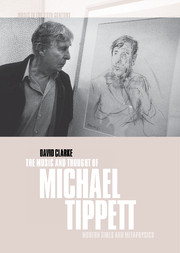Book contents
- Frontmatter
- Contents
- Acknowledgements
- References to Tippett's scores and essays
- 1 Tippett and the ‘world vision’ of modernity
- 2 The significance of the concept ‘image’ in Tippett's musical thought: a perspective from Jung
- 3 Back to Nietzsche? Transformations of the Dionysiac in The Midsummer Marriage and King Priam
- 4 Metaphysics in a cold climate: The Vision of Saint Augustine
- 5 ‘Shall we …? Affirm!’ The ironic and the sublime in The Mask of Time
- 6 The meaning of ‘lateness’: mediations of work, self and society in Tippett's Triple Concerto
- 7 The golden bird and the porcelain bowl: Byzantium and the politics of artefacts
- Notes
- Bibliography
- Index
6 - The meaning of ‘lateness’: mediations of work, self and society in Tippett's Triple Concerto
Published online by Cambridge University Press: 13 October 2009
- Frontmatter
- Contents
- Acknowledgements
- References to Tippett's scores and essays
- 1 Tippett and the ‘world vision’ of modernity
- 2 The significance of the concept ‘image’ in Tippett's musical thought: a perspective from Jung
- 3 Back to Nietzsche? Transformations of the Dionysiac in The Midsummer Marriage and King Priam
- 4 Metaphysics in a cold climate: The Vision of Saint Augustine
- 5 ‘Shall we …? Affirm!’ The ironic and the sublime in The Mask of Time
- 6 The meaning of ‘lateness’: mediations of work, self and society in Tippett's Triple Concerto
- 7 The golden bird and the porcelain bowl: Byzantium and the politics of artefacts
- Notes
- Bibliography
- Index
Summary
Prospects
If periodization is an inveterate musicological habit, Tippett's œuvre is certainly among those which provoke it. Putting it this way is a reminder that the practice involves two elements not necessarily pre-disposed to mesh (and this gears us up for a little dialectical thinking). On the one hand, the division of a composer's body of work into style periods may seem to be dictated by its formation as an object. On the other hand, periodization is the practice of an investigating subject who applies the conceptual schemata of a particular discursive culture (musicology). And since concepts by their very nature come preformed, they are less than completely customized to the particulars they map (and less than unmarked by the ideology of their previous applications). ‘Lateness’ is exactly such a concept – one that Tippett's œuvre attracts at the same time as laying open the problematics of its usage. Those problematics surface as soon as we begin to ask the most basic questions regarding a possible late period – such as, when did it begin? what are its characteristics? But if we want to construe an œuvre as more than just a list of works, we can neither ignore such problematics nor expect to find a tidy resolution of them.
While the ascription of a late period to Tippett is beset by equivocation and contradiction, the earlier stylistic juncture marked by his second opera, King Priam (1958–61), is much more clear cut.
- Type
- Chapter
- Information
- The Music and Thought of Michael TippettModern Times and Metaphysics, pp. 206 - 235Publisher: Cambridge University PressPrint publication year: 2001



